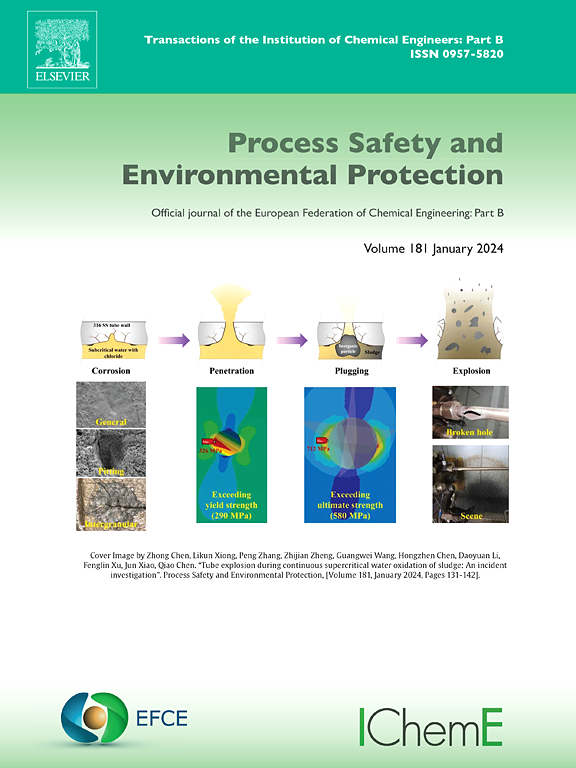Study on the pressure effect and risk assessment of aspartic acid polycondensation process
IF 7.8
2区 环境科学与生态学
Q1 ENGINEERING, CHEMICAL
引用次数: 0
Abstract
The generation of substantial amounts of gaseous products during the thermal polycondensation of aspartic acid (ASP) can result in an increase in reactor pressure. To fully characterize the reactivity hazards of ASP polycondensation, the energy release and gas generation were comprehensively characterized using differential scanning calorimetry (DSC), synchronous thermal analysis (STA), and thermogravimetric-infrared-mass spectrometry (TG-FTIR-MS). ASP polycondensation is an endothermic process, but it is marked by two pronounced pressure increases. The polycondensation process involves dehydration, deamination, decarboxylation and cleavage reactions at two temperature zones, respectively. In the risk assessment for ASP polycondensation, the risk criterion based on thermal effects are inapplicable to this reaction. The severity and probability of such a reaction can be quantified using the reaction pressure rise () and the time to reach the maximum pressure rise rate (tmrP), respectively. Ambient temperature is critical for the safe operation of the ASP polycondensation reaction. This study provides new insights for optimizing the control strategy of the ASP polycondensation process and enhancing the assessment of pressure-related risks.
天冬氨酸缩聚过程压力效应及风险评价研究
在天冬氨酸(ASP)的热缩聚过程中产生大量的气体产物会导致反应器压力的增加。采用差示扫描量热法(DSC)、同步热分析(STA)和热重-红外-质谱法(TG-FTIR-MS)对ASP缩聚过程的能量释放和气体生成进行了全面表征。三元共聚缩聚是一个吸热过程,但它的特点是两个明显的压力增加。缩聚过程包括脱水、脱胺、脱羧和裂解反应,分别在两个温度区进行。在ASP缩聚反应的风险评价中,基于热效应的风险准则不适用于该反应。这种反应的严重性和概率可以分别用反应压力上升(∆P)和达到最大压力上升速率(tmrP)的时间来量化。环境温度对三元共聚物缩聚反应的安全运行至关重要。该研究为优化三元共聚物缩聚过程的控制策略和加强压力相关风险的评估提供了新的见解。
本文章由计算机程序翻译,如有差异,请以英文原文为准。
求助全文
约1分钟内获得全文
求助全文
来源期刊

Process Safety and Environmental Protection
环境科学-工程:化工
CiteScore
11.40
自引率
15.40%
发文量
929
审稿时长
8.0 months
期刊介绍:
The Process Safety and Environmental Protection (PSEP) journal is a leading international publication that focuses on the publication of high-quality, original research papers in the field of engineering, specifically those related to the safety of industrial processes and environmental protection. The journal encourages submissions that present new developments in safety and environmental aspects, particularly those that show how research findings can be applied in process engineering design and practice.
PSEP is particularly interested in research that brings fresh perspectives to established engineering principles, identifies unsolved problems, or suggests directions for future research. The journal also values contributions that push the boundaries of traditional engineering and welcomes multidisciplinary papers.
PSEP's articles are abstracted and indexed by a range of databases and services, which helps to ensure that the journal's research is accessible and recognized in the academic and professional communities. These databases include ANTE, Chemical Abstracts, Chemical Hazards in Industry, Current Contents, Elsevier Engineering Information database, Pascal Francis, Web of Science, Scopus, Engineering Information Database EnCompass LIT (Elsevier), and INSPEC. This wide coverage facilitates the dissemination of the journal's content to a global audience interested in process safety and environmental engineering.
 求助内容:
求助内容: 应助结果提醒方式:
应助结果提醒方式:


